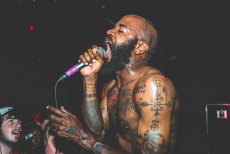
Email: reecejordan98@hotmail.co.uk
Total Article : 168
About Me:18-year-old sixth form student, studying English Literature, History and Government and Politics. My articles will broadly cover topics from the current affairs of politics to reviews of books and albums, as well as adding my own creative pieces, whether it be short fiction or general opinion.

The first influential throbs of punk music originated, it could be said, in the permeating tumultuousness within a generation in the latter half of the 1960’s. One musical historian described it as “middle class people rejecting middle class values” in America and the British youth “reacting to the bourgeois status quo”. Rather aptly, it began underground, and was first seen from the likes of The Velvet Underground, headed by Lou Reed, The Ramones and The Stooges. The sloppiness and spit-in-the-face attitude against the usual conventions of appraised music – that being either complex, catchy or melodious – was seen by many a disaffected youth to be a projection of their inner angst, or, rather paradoxically, a community for outsiders to be a part of. This going-against-the-gradient method of making music brought up many arguments in its dexterity of musicianship, which was, quite rightly, counteracted with the question of art – is it a means for passive stimulation or outlet of human emotion?
Along the progression of the 70’s, punk music generally stayed underground in the U.S. but the U.K. was taken by storm by the surge of The Sex Pistols, which were taken as a full-scale threat to both the government and the monarchy. Their first and only album, Never Mind the Bollocks, Here’s the Sex Pistols, revolutionised the punk genre and, in turn, revolutionised the music industry in general.
Soon, stretching into the 80’s, punk had devolved into various other genres, including new wave. New wave combined both the elements of punk and pop thus allowing a more rich diversity of music.
Punk showed semblance of rock & roll only by means of gnawing it down to the bone. Catchy hooks were discarded for, or embraced by, power chords overloaded with distortion. Apolitical innocuous lyrics were eaten up by incendiary screams of injustice and Mohicans stamped out side-partings. Adrenalised simplicity was key and thus the majority of the time brevity was preferred over longevity. In order to ascertain the sound of oppression and antipathy, many bands would never dare flirt with the concept of a hi-fi record and instead stick to the rawness of lo-fi.
New wave, however, was less contained in rigidity; it saw an influx to the gravitation of synth use and prided itself on melodic satisfaction, catchy instrumentation and modernist production. With its pop hooks and retrospectively embarrassing attire, new wave earned commercial success until it eventually subsided around 1984, when the likes of The Smiths would wear the crown for guitar-orientated music.
And so what of these genres of music now? Well, like the music that preceded it, punk and new wave has extended its influence into the present time. You need only look for The Strokes frontman, Julian Casablancas, and his new band The Voidz to see both the punk and new wave heart vigorously and proudly beating. In a perhaps even more unadulterated form of punk, the new band Slaves have emerged from the depths to produce snotty and grimey music to attune to the tumultuous attitude sweeping the nation. Yes, punk and new wave are alive and kicking.
Image Credits: dazeddigital.com

0 Comment:
Be the first one to comment on this article.